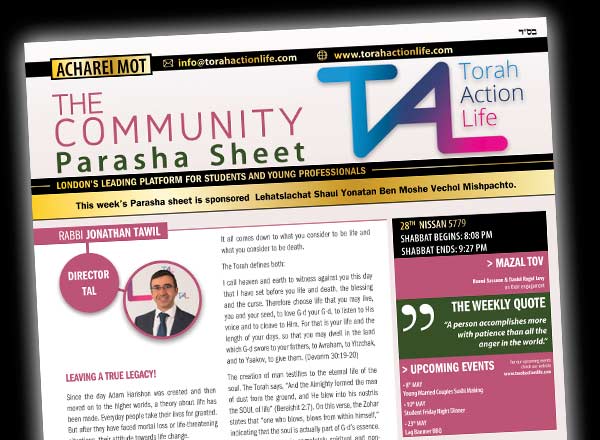
The prophet Yehezkel foresaw the demise of the first Beit Hamikdash when the Jewish people were going through a lot of suffering and realized the end was near, he fell on his face and cried out to Hashem to have compassion upon the Jewish people. Hashem replied, that although the Jewish people will be scattered amongst the nations and that there will be tremendous troubles and suffering, there always be a Mikdash Me’at/a small sanctuary where they can run to, pour their hearts out to Hashem. (Yehezkel 11.16)
This is precisely the place where Hashem’s presence is located.
The Gemara Megillah 29a questions the meaning of Mikdash Me’at, Rebi Yitzhak answers that this refers to our shuls and Yeshivot. Throughout the course of history we have always had a shul to escape to and converse to the almighty, acting as a conduit to answer our prayers and continuously deliver us through the darkness of exile. Wherever Jews have settled we have always had shuls in every location throughout the world, weather in oppressive regimes or in spiritual wildernesses we have ceaselessly established our Mikdash Me’at as our focal point. Our Mikdash Me’at has customarily been the centre for joyous occasions as well as sorrowful events.
Maran Shulchan Aruch (A’H 150) writes that a shul in its structure should be the most prominent and tallest building in the vicinity, so people should be aware that this is Hashem’s residence. When pious Jews of previous generations would enter shuls they would put their hand on the mezuzah, bow down fully and declare the following
“I will come with your abundant lovingkindness enter into your house, I will bow down towards your holy temple in fear of you”. (Tehillim 5.8)
King David wrote in Tehillim 55.15 when approaching the shul he would announce;
“בבית אלקים ההלך ברגש – In the house of Hashem we walked with emotion”, his heart would be set ablaze with deep passion and devotion. Chazal mention the word ברגש/ emotion is the acronym for; ברד – ב/ hail, רוח – ר/ wind, גשם – ג/ rain, שלג – ש/ snow, despite the weather conditions we are determined to come to shul and meet the divine presence.
In recent times there’s a particular epidemic that is destroying our shuls, our environment and to some degree our spiritual wellbeing. Maran Shulchan Aruch (A’H 124.7) explicitly writes that a person is forbidden to talk in shul, during the prayers and especially during the repetition of the Amidah as well the reading of the Torah. He writes that if an individual did speak he is called a “חוטא/sinner” to what extent writes Shulchan Aruch “גדול עונו מנשוא- that his sin is too great to tolerate״.
The famed dean of Lakewood yeshiva Rabbi Mattisyahu Solomon mentions that he looked through the entire Shulchan Aruch and only once found the Shulchan Aruch describe “a sin too great to tolerate” – this was in reference to talking in synagogue! This signifies that other sins such eating on Yom Kippur, eating hametz on pesach, desecrating Shabbat, although catastrophic are not sins too great to tolerate as that of talking in shul. Once a person speaks in shul it’s not a case of defiling the shul or disrespecting the shul, explains Rabbi Mattisyahu Solomon, rather that if one truly believes that prayer is a conversation with Hashem and the Hazan whom is representing them, cry’s out to Hashem to bless us, heal us, provide us with a stable livelihood; then we would never speak in shul. The only reason why a person talks in shul is because Hashem doesn’t appear in a form we can relate our conversations too. Instead talking severs our connection to Hashem. We find this concept in a passuk in Tehillim 16.8 ; ״שויתי ה׳ לנגדי תמיד״ – ” I have set the Lord always before me”, since Hashem is all encompassing, once a person is standing before the King of Kings that person is acknowledging an overwhelming feeling of reverence, admiration and fear of where he’s standing and what his intentions are.
In the times of the atrocity of “Tach v’tat (1648/9) when Ukrainian Cossacks massacred an estimated 300,000 Jews (perhaps 30% of the total Jewish population), it was during this terrible time there was a great rabbi called Tosafot Yom Tov who enacted a special prayer refraining from talking in shul. Since these events came about because Jewish people were talking in shuls. He instituted a “Mi Sheberach” blessing, which some communities say until today, for any individuals who were able to guard his lips and who were able desist from talking any mundane matters during the whole course of tefillah.
There is a well known passuk that states; “ה׳ ילחם לכם ואתם תחרישון” – Hashem will fight for you, and you shall be silent” (שמות 14.14). When Moshe Rabbeinu was at the splitting of the sea and there was no deliverance at sight, Hashem made a solemn promise to Bnei Yisrael that in order to see salvations you must believe in me and remain quiet.
Our Rabbi’s of blessed memory mention a segulah that the word ״שיבה״/ long life is the acronym for – שתיקה יפה בשעת התפילה״” Silence is good during tefillah”, and the reward for being silent in our Mikdash Me’at is שיבה.
May we merit to find favour and grace in the eyes of Hashem at all times and dedicate our prayers and supplications to Hashem wholeheartedly.
This Dvar Torah is dedicated to my father ראובן בן סלאם יוסף זצ׳ל – who unflinching committed himself to always residing in a Mikdash Me’at.







